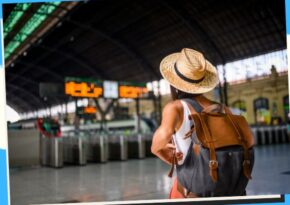
Your Safety Matters: 25 Insider Insights for Successful Solo Travel!
Are you a solo traveler? Your safety matters. Discover essential safety strategies that every adventurer should know, from choosing secure accommodations to navigating unfamiliar environments with confidence.
Solo Travel: How to Stay Safe While Traveling Alone 🌍👤✈️
Traveling solo can be an incredibly empowering and rewarding experience, allowing you to explore new destinations on your own terms. However, safety should always be a top priority. Whether you’re embarking on your first solo adventure or you’re a seasoned traveler, here’s a comprehensive guide on how to stay safe while traveling alone.
1. Research Your Destination Thoroughly 📚
Before you set off, spend time researching your destination. Learn about the local culture, customs, laws, and potential safety concerns. Check travel advisories from your government and read travel forums or blogs to gain insights from other solo travelers who have visited the same place.
2. Choose Accommodations Wisely 🏨🌆
Opt for reputable accommodations with positive reviews. Hostels, guesthouses, and hotels with good security measures are preferable. Consider staying in well-trafficked areas, especially if you’re arriving late at night. Research the neighborhood’s safety and accessibility.
3. Share Your Itinerary 🗺️📆
Share your travel itinerary with a trusted friend or family member. Provide them with details of your accommodation, transportation, and any planned activities. Check-in with them regularly and let them know if your plans change.
4. Stay Connected 🔌📱
Keep your phone charged and have a portable charger handy. Get a local SIM card if possible or make sure you have a way to access the internet. This will help you navigate, communicate, and stay connected with loved ones.
5. Be Aware of Your Surroundings 🧐🌆
Stay alert and pay attention to your surroundings. Avoid distractions like excessive smartphone use when walking in unfamiliar areas. Trust your instincts – if a situation feels uncomfortable, it’s okay to remove yourself from it.
6. Dress Appropriately 👚👖
Respect local customs and dress codes, especially in conservative cultures. Dressing appropriately can help you blend in and avoid unwanted attention. Avoid wearing flashy jewelry or displaying expensive electronics.
7. Use Reliable Transportation 🚕🚇
Choose reputable transportation options. Use licensed taxis, rideshare services, or public transportation recommended by locals or your accommodation. Avoid hitchhiking or accepting rides from strangers.
8. Secure Your Belongings 🔒🎒
Invest in a quality lock for your luggage. Use lockers provided by hostels or accommodations to store your valuables. Be cautious with your belongings in crowded places and be discreet when using your phone or camera.
9. Avoid Excessive Alcohol Consumption 🍻🚫
While it’s okay to enjoy local drinks and socialize, avoid excessive alcohol consumption. Being in an unfamiliar environment can make you more vulnerable if you’re not in control of your senses.
10. Learn Basic Local Phrases 🗣️🌍
Learning a few basic local phrases can go a long way in establishing connections and showing respect for the local culture. It can also help you ask for directions or assistance if needed.
11. Trust Your Instincts 🤔🕵️♀️
Your gut feeling is a powerful tool. If something doesn’t feel right, trust your instincts and remove yourself from the situation. Your safety is more important than being polite or not wanting to offend.
12. Stay In Public Areas at Night 🌃👣
At night, stick to well-lit and busy areas. Avoid poorly lit streets and alleys. If you’re out late, consider taking a taxi or rideshare instead of walking alone.
13. Keep Copies of Important Documents 📝📃
Make copies of your passport, ID, travel insurance, and any other important documents. Store these copies separately from the originals. Having digital copies on a secure cloud storage platform is also a good idea.
14. Avoid Over-sharing on Social Media 📸🌐
While it’s tempting to share your travel experiences on social media, avoid revealing too much about your current location or plans. Oversharing can make you a target for scams or theft.
15. Use Reliable ATMs and Currency Exchange 🏦💰
When withdrawing money or exchanging currency, use reputable banks or ATMs located in secure areas. Be cautious of overly generous offers from strangers, as they could be attempting to scam you.
16. Blend In as Much as Possible 🕶️👒
While it’s difficult to completely blend in as a tourist, try to avoid standing out excessively. Dress like the locals, be mindful of your behavior, and be respectful of the local customs.
17. Have an Emergency Plan 🚑📞
Familiarize yourself with the local emergency numbers and the location of the nearest embassy or consulate. Keep a list of emergency contacts handy, including the local police and your country’s embassy.
18. Take Care of Your Health 🏥💊
Ensure you have travel insurance that covers medical expenses. Research the availability of medical facilities in your destination. Carry any necessary medications and a basic first aid kit.
19. Stay Cautious with New Acquaintances 🙅♀️🤝
While making friends on the road can be rewarding, exercise caution when meeting new people. Avoid sharing personal information too quickly and meet in public places.
20. Avoid Political or Social Unrest 🚫🗳️
Stay informed about the political and social situation of your destination. Avoid participating in demonstrations or political discussions that could potentially put you in harm’s way.
21. Learn Self-Defense Basics 🥋👊
Consider taking a self-defense class before you travel. Learning basic techniques can boost your confidence and help you react in unexpected situations.
22. Be Mindful of Public Wi-Fi 📶🔒
Public Wi-Fi networks can be insecure. Avoid accessing sensitive information, such as online banking, while connected to public Wi-Fi. Use a virtual private network (VPN) for added security.
23. Plan Ahead for Solo Night Outs 🌙🍽️
If you plan to go out at night, research the area beforehand. Choose venues that are well-reviewed and frequented by both locals and tourists.
24. Know Scam Tactics 🕵️♂️🃏
Familiarize yourself with common scams in your destination. Be cautious of overly friendly strangers, unsolicited offers, and situations that seem too good to be true.
25. Trust Locals and Ask for Advice 🤝🗺️
Locals often have the best insights into their own communities. Don’t hesitate to ask for advice on safe areas, reputable services, and any potential hazards.
Conclusion: Empower Yourself with Knowledge and Awareness 🚀🌟
Solo travel can be an enriching and life-changing experience, but safety should always be a top priority. By arming yourself with knowledge, practicing awareness, and following these safety tips, you can navigate new destinations confidently and create unforgettable memories. Remember, with the right precautions, your solo journey can be both thrilling and secure.
Save/Share this article with a QR CODE
Related Queries
🛡️ Unlocking Safety Secrets: Master Solo Travel with Expert Tips! 🌍
✈️ Adventurer’s Guide: Ensuring Safety on Solo Travels! 🛡️
📚 Fearless and Prepared: Ultimate Solo Travel Safety Handbook! 🌍
🛡️ Embark on Safe Journeys: Essential Tips for Solo Travelers! ✈️
🚀 Solo Travel Security Unveiled: Your Key to Stress-Free Adventures! 🌍
💪 Empower Your Solo Journey: Stay Safe with Proven Travel Strategies! 🛡️
🌍 Fear Not, Wander Far: Top Safety Measures for Solo Explorers! ✈️
🛡️ Your Safety Matters: Insider Insights for Successful Solo Travel! 🚀
💼 Confident Solo Travel: Expert-Backed Safety Tips You Can’t Miss! 🌍
🛡️ Solo Travel Safety 101: Explore Securely on Your Solo Adventures! 🌍
Please be advised that the information presented here is subject to change, and it is highly recommended to consult local authorities for the latest and most accurate updates.
Feel free to email us if we have overlooked travel and tourism guides, safety tips, recreational options, leisure activities, or any useful links. Your feedback is valuable to us, and we’re here to assist you in any way we can!
DisclaimerThe information is for educational purposes only and subject to change, and it is highly recommended to consult local authorities for the latest and most accurate updates. We do not constitute endorsement of any specific technologies or methodologies or endorse of any specific products or services.📩 Need to get in touch?Feel free to Email TravelingSmartly.com for comments, suggestions, reviews, or anything else. |








Comments (0)